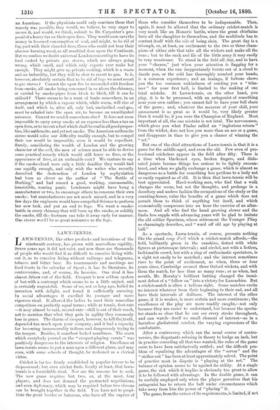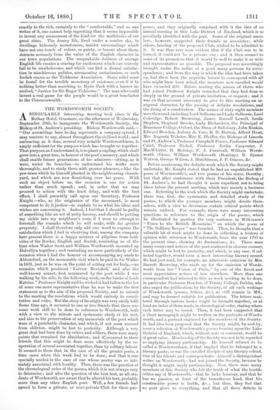LAWN-TENNIS.
LAWN-TENNIS, like other products and inventions of the nineteenth century, has grown with marvellous rapidity, Seven years ago it did not exist, and now there are thousands of people who would find it as difficult to conceive living with- out it, as to conceive living without railways and telegrams, tobacco and bitter beer. Its tournaments and meetings arc fixed feasts in the calendar of Sport ; it has its literature, its controversies, and, of course, its heresies. One rival it has almost driven out of the field. Croquet is now seldom spoken of but with a contempt which seems to us a little unjust, and is certainly ungrateful. Some of us, not so long ago, hailed its invention with delight, and found it sufficiently amusing. In social advantages it excelled its younger and more vigorous rival. It allowed. the ladies to meet their masculine competitors on perfectly equal terms ; while at tennis, first-rate —it may almost be said, second-rate—skill is out of their reach, not to mention that what they gain in agility they commonly lose in grace. The charm of croquet, however, to tell the:truth, depended too much upon your company, and it had a capacity for becoming immeasurably tedious and dangerously trying to the temper. Besides, it somehow lacked manliness. The scorn which everybody poured on the "croquet-playing curate" was positively dangerous to the interests of religion. Excellence at lawn-tennis seems to put a man upon a different plane, and may even, with some schools of thought, be reckoned as a clerical virtue.
Cricket is far too firmly established in popular favour to be dispossessed ; but even cricket finds, locally at least, that lawn- tennis is a formidable rival. Nor are the reasons far to seek. The new game requires but two, or, at the most, four players, and does not demand the protracted negotiations, and even diplomacy, which may be required before two elevens can be brought together in the field. You have not to propi- tiate the great bowler or batsman, who have all the caprice of those who consider themselves to be indispensable. Then, again, it must be allowed that the ordinary cricket-match is very much like an Homeric battle, where the great chieftains have all the slaughter to themselves, and the multitude has to content itself with the rule of being slain. The great day is a triumph, or, at least, an excitement to the two or three cham- pions of either side that take all the wickets and make all the runs ; but to the rank and file of the little army it may easily be very wearisome. To stand in the field all day, and to have your " chance," just when your attention is flagging for a moment, when the sun inopportunely bursts out of a cloud to dazzle you, or the cold has thoroughly numbed your hands, is a common experience ; and an innings, if fortune shows you the too common unkindness of sending you a "trim- mer " for your first ball, is limited to the making of one fatal mistake. At Lawn-tennis, on the other hand, you play, it is to be presumed, with an antagonist of something near your own calibre ; you cannot fail to have your full share of the game; and, whatever the measure of your skill, your amusement is as great as it would be, very likely greater than it would be, if you were the Champion of England. Most important of all, the one mistake is not fatal. The nervousness, which gives you what Pindar called an " inglorious return " from the wicket, does not lose you more than an ace or a game, and disappears in time to give you a chance of winning the " set."
But one of the chief attractions of Lawn-tennis is that it is a game for the middle-aged, and even the old. Few even of pro- fessional cricketers appear in the field after fifty. There is a time when blackened eyes, broken fingers, and dislo- cated joints become things too serious to be lightly encoun- tered, and when we gladly exchange a game, which is almost as dangerous as a battle for something less perilous to a body not so easily repaired as of old. It is then that lawn-tennis will be best appreciated. Hard-working men, who find that a walk changes the scene, but not the thoughts, and prolongs in a desultory and useless fashion the occupations of the study or the counting-house, value the benefits of a game which does not permit them to think of anything but itself, and which economically compresses into an hour the exercise of an after- noon. And all who find the hand growing slower and the limbs less supple with advancing years will be glad to imitate the old soldier Spurinna, whose retirement the Younger Pliny so charmingly describes, and " ward off old age by playing at ball."
As a spectacle, Lawn-tennis, of course, presents nothing like the grand coup d'ceil which a cricket-match affords,—the field, brilliantly green in the sunshine, dotted with white figures at picturesque intervals ; and circled, not with a listless, fashionable crowd, but with a ring of enthusiastic spectators, is a sight not easily to be matched ; and the interest sometimes rises to the point of excitement, as when, three or four years since, Cambridge secured three Oxford wickets, and with them the match, for less than as many runs ; or as when, last month, Mr. Hornby's brilliant batting changed the immi- nent defeat of a " follow on " into a victory for Lancashire. But a cricket-match is 'often a tedious sight. Some matches excite no interest whatever from their beginning to their end, and all have their intervals of dullness. The interest of the other game, if it is weaker, is more certain and more continuous ; the excellences of the play are more readily caught,—not only because they are easier to understand, but because the specta- tor stands so close that he can see every stroke throughout, and can watch—itself no small element of interest—as in a harmless gladiatorial combat, the varying expressions of the combatants.
After a controversy which ran the usual course of contro- versies, the disputants refusing in theory to budge an inch, but in practice conceding all that was wanted, the rules of the game seem to have been satisfactorily settled; and the difficult pro- blem of equalising the advantages of the " server " and the " striker out " has been at least approximately solved. The point of practice most in dispute is " playing at the net." The balance of opinion seems to be against its utility. At a single game, the risk which it implies is obviously too great to allow it to be followed with advantage. In the double game, it can be usefully employed only when the player perceives that his antagonist has to return the ball under circumstances which take away from him the power of "placing" it. The game, from the nature of its requirements, is limited, if not exactly to the rich, certainly to the " comfortable," and as one writes of it, one cannot help regretting that it seems impossible to invent any amusement of the kind for the multitudes of our great cities. The dreary life, lived under a sombre sky, in dwellings hideously monotonous, amidst surroundings which have not one touch of colour, or gaiety, or beauty about them, detracts seriously from the value of the English character iu our town populations. The unspeakable dullness of average English life creates a craving for excitement which can scarcely fail to be unwholesome, and which can find a dismal satisfac- tion in mischievous politics, unreasoning sectarianism, or such foolish crazes as the Tichborne Association. Some relief must be found for the terrible monotony of existence, even if it be nothing better than marching to Hyde Park with a banner in- scribed, " Justice for Sir Roger Tichborne." The man who could invent a real game for the people would be a great benefactor to the Commonwealth.



































 Previous page
Previous page